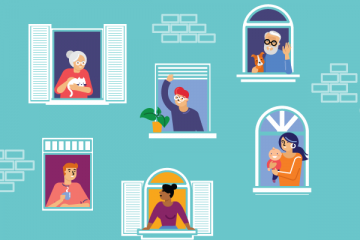
Although recent news about COVID cases and variants has renewed anxiousness about the pandemic, the gradual, international rollout of vaccines has given a rough sense of closure to this chapter of our histories. In the past year, by changing the way we travel and work, COVID-19 has changed the way we learn, connect, grow and grieve. As we try to move on from the initial impact of COVID-19, let us examine how the pandemic’s ripples will impact different aspects of our future.
WORK
Ever since the formation of societies, disease has been capable of uprooting lives and societal norms. Centuries ago, in the aftermath of the Black Death, the entire system of feudalism was thrown into peril due to a shortage of surviving peasant farmers. In response, lords decreased costs of living for peasants, trying to encourage more peasants to live on their land.
In our century, COVID-19 has disproportionately affected the poor, working class, and has also made clear the harshness with which big franchises and governments are willing to treat employees. The workers have responded in turn. As of the end of April, Becker’s Hospital Review reported 4 hospital worker strikes in 2021 in the US. More recently, fast food chains like Wendy’s and McDonalds have been increasing wages due to low employment and worker strikes. Cornell’s Labor Action Tracker tracks strikes and protests across the United States, indicating that there has been no shortage of workers speaking up in the recent year. New Zealand, the UK, and Indonesia are among many other countries that faced strikes in a range of industries. While some historians note that an increase in workers rights often eventually fades away again, COVID-19 has started much needed conversations about workers rights and how we treat our essential workers.
On an every day scale, COVID-19 has also affected the way in which workplaces are structured. Many employers have reported that hybrid or remote workspaces have increased productivity. In the long term, many businesses are planning on having more online workspaces over onsite employees, so the working world that AISG students step into after graduation may very well be different from the traditional workspaces we know.
HEALTH
Despite reports of increased productivity, online/hybrid work has greatly increased levels of office employee, academia, parent, and student burnout. In addition, COVID has worsened the impact and number of depression, anxiety, and OCD cases.
The World Health Organization has stepped up to acknowledge the increased barriers and disruptions to mental health treatment due to the pandemic. Worryingly, there doesn’t seem to be a lot of research speculating on the future of mental healthcare based on current trends, although have been both superficial solutions and research-backed suggestions for experts from publications like The Lancet.
However, it must be noted that there has been a LOT of general research on mental health in relation to the pandemic. Just a quick Google search can pull up a huge variety of recent research on mental health, and organizations like the Black Dog Institute promise that research is happening behind the scenes. In a way, this is a good sign, as it indicates that there are people investing time and money into addressing an issue that used to be considered taboo or a personal failure rather than a societal issue.
The pandemic has also encouraged telemedicine, where remote doctor visits replace unnecessary in-person visits. While this shift was initially made out of necessity, experts have noted that it keeps moderately sick patients from getting infectious diseases at hospitals and allows doctors to focus on those who need critical care. In the future, it may be possible to get more official telemedicine healthcare, so the internet will hold more than alarming Google symptom checklists.
TECHNOLOGY
After months of online or hybrid learning and teaching, the last thing many of us want to read more about is e-learning. However, it is important to note that the pandemic has highlighted a glaring digital divide, where poorer people have not had access to the same devices and resources than our more fortunate community, for both learning and work. Being limited to online spaces has emphasized the digital divide and its severe consequences, and also encouraged investments to make online spaces more accessible to everyone.
ENTERTAINMENT
Although the live theater and music industries have also suffered greatly due to pandemic shutdowns, some groups have managed to adapt relatively well to their new performance spaces, the internet. Artists have put a lot of effort into bringing their live performance vibes to the big screen, a process that takes a lot of effort, planing and creative thinking. As we move forward, in addition to future reopening of concerts and live performances, there are also a lot of innovative online performances for us to look forward to. Experts also predict, based on previous post-pandemic eras, that societies will be very eager to return to parks and other recreational spaces after they reopen, so there will be a lot of investment in overall post-pandemic entertainment.
IDENTITY
Experts also predict that COVID-19 will change the way the public thinks about societies and people in power. As seen in the news, this article and increasingly in our everyday lives, every aspect of society is linked and relevant to us in some way. While these connections have always existed, the crisis of the pandemic has really put them in the spotlight and forced us to rethink our worldviews. Many believe that this will make society less individualistic, yet also pay more attention to the world of politics which governs so many of these aspects at the same time.